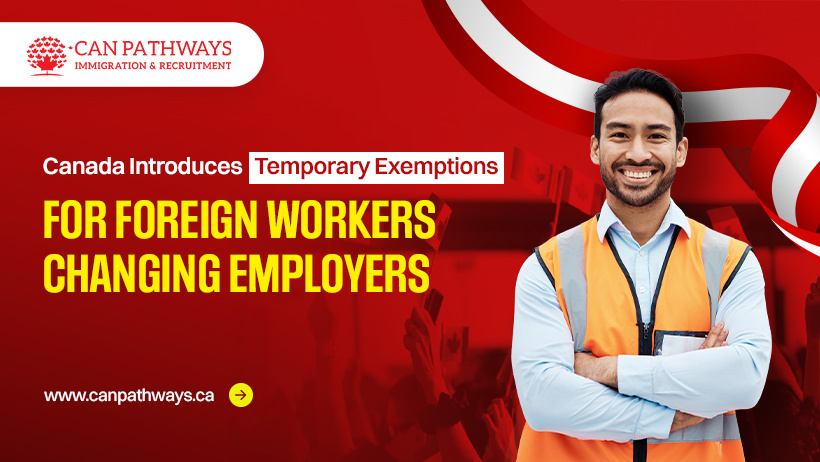Overview
Temporary foreign workers play a vital role in addressing labour and skill shortages across all sectors of the Canadian economy. These workers are generally expected to honor their employment contracts and arrive in Canada intending to work for the employer who recruited them and submitted the job offer.
However, circumstances beyond the control of either the worker or employer may arise, making it impossible to continue the original employment. These situations may include internal role changes, layoffs, workplace conflict or incompatibility, or opportunities for better compensation or career advancement with a new employer—each of which would require the worker to obtain a new work permit.
Currently, foreign workers in such situations must wait until their new work permit is fully processed before beginning their new role. This process can take several weeks, often resulting in extended employment gaps for the worker and delays for employers looking to quickly hire talent already in Canada.
Key Policy Factors
Aligned with the Government’s objective to reduce the intake of new temporary foreign workers into Canada, it is essential to better leverage the skills and training of those already in the country. Providing workers with a timely and viable option to change employers supports both economic efficiency and individual stability. A swift employment transition benefits employers by enabling them to hire workers already in Canada and allows workers to maintain financial stability without lengthy interruptions in employment.
The purpose of this public policy is to allow temporary foreign workers currently in Canada who have secured a new job offer under either the Temporary Foreign Worker Program or the International Mobility Program to begin work more quickly—prior to the final approval of their new work permit application.
Accordingly, I hereby declare that, under my authority pursuant to section 25.2 of the Immigration and Refugee Protection Act (the Act), sufficient public policy grounds exist to grant exemptions from specific requirements of the Act and the Immigration and Refugee Protection Regulations (the Regulations), as outlined below, to foreign nationals who meet the specified eligibility criteria.
These measures enable foreign workers in Canada with valid work authorization—who must obtain a new work permit before starting a new job—to commence employment while their application is still being processed.
Individuals expected to benefit include foreign nationals who:
- Are on “maintained status,” authorized to work while their work permit application is pending, but restricted by conditions of their expired permit preventing them from changing occupation or employer during this status;
- Hold a valid work permit limited to a specific employer but need to transition to a different employer or occupation, for reasons such as layoffs; or
- Are exempt from needing a work permit in their current role but require one to work in a new occupation or for a new employer.
Requirements for Eligibility
Based on public policy considerations, delegated officers may grant an exemption from the specified requirements of the Regulations if the foreign national:
- Is currently in Canada with valid temporary resident status;
- Meets the criteria outlined in paragraphs 199(a) or 199(b) of the Regulations;
- Has submitted either:
- A work permit renewal application under subsection 201(1) of the Regulations to perform work described in subparagraphs 200(1)(c)(ii.1) or 200(1)(c)(iii), for which a decision is still pending; or
- A new work permit application to perform work described in paragraphs 200(1)(c)(ii.1) or 200(1)(c)(iii), which is also awaiting a decision;
- A work permit renewal application under subsection 201(1) of the Regulations to perform work described in subparagraphs 200(1)(c)(ii.1) or 200(1)(c)(iii), for which a decision is still pending; or
- Intends to work for the new employer and/or in the occupation specified in the job offer included with their work permit application referenced above;
- Has applied for the public policy exemption through the department’s designated electronic system, or through an alternative method provided by the department if the foreign national is unable to use electronic means; and
- Has requested that the exemption remain in effect until a final decision is made on their work permit application.
Provisions Eligible for Public Policy Exemption
Paragraph 183(1)(b): The condition prohibiting work unless authorized under Part 9 or Part 11 of the Regulations.
- Subparagraphs 185(1)(b)(i) to (iv): The obligation to comply with conditions related to the type of work, the employer, and the permitted or prohibited work hours and periods for temporary residents in Canada.
- Section 196: The requirement to have authorization to work in Canada through a valid work permit or as specified by the Regulations.
Exemptions granted under this public policy will remain in effect until a final decision is made on the work permit application referenced in condition 3 of this policy, or until the application is withdrawn.
Other Eligibility and Assessment Criteria
Foreign nationals who qualify under this public policy must still meet all other applicable eligibility and admissibility requirements that are not specifically exempted by this or any other public policy.
Start and End Dates
This public policy revokes and replaces the temporary policy, signed on May 6, 2020, which exempted foreign nationals in Canada from certain requirements when changing employment during the COVID-19 pandemic.
This policy will come into effect 12 weeks after the date it is signed.
It will remain in force until formally revoked by the Minister of Immigration, Refugees and Citizenship Canada.







